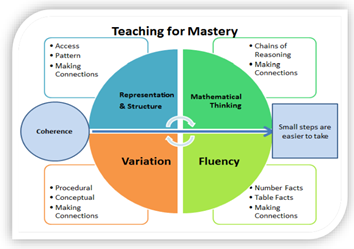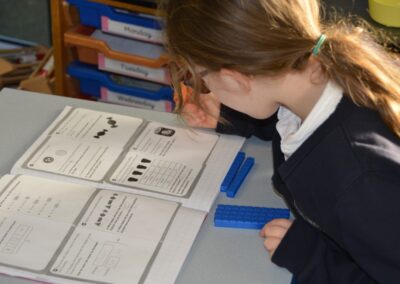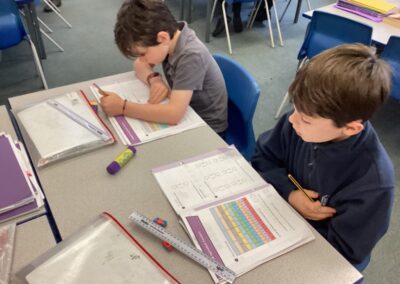Impact. Intent and Implementation
Intent:
Maths is an essential life skill which permeates all aspects of everyday life and allows us to contribute and succeed in our future careers. At St Peter’s, we believe that every child can achieve in maths and we will empower our children with a confidence, resilience and ‘can do’ attitude which will inspire and engage them as mathematicians.
This will be achieved through ‘quality-first’ teaching and a curriculum which challenges and supports learning. We recognise maths as a creative subject which looks for patterns, makes connections and finds new ways to look at the world; our children will be able to relate this to practical and ‘real life’ contexts. All adults in school will have a positive attitude towards maths and will champion the subject within the wider community.
Our curriculum builds upon the ‘Mastering Number’ and ‘Securing Times Tables’ approaches, to reduce cognitive load, develop talk for maths and focus on developing a strong sense of number, fluency and the skills which will lead to mastery of number. This will allow our children to use a range of techniques and approaches to solve problems and calculations.
The mastery curriculum will allow learners to secure a deep understanding of mathematical concepts which will establish a solid foundation upon which further learning can be built. We see Maths as another language that children can develop fluency in: having the Mathematical toolkit alongside a positive mindset to tackle it.

Year groups will, as far as possible, be taught together and move on together. There will be clear and consistent progression in lessons which will allow mathematical skills to build. Additional provision and pre-teaching will allow all children to access this learning and develop a love of maths.
We follow the progression of the 2014 National Curriculum and EYFS curriculum goals.
Aims
- Become fluent in the fundamentals of mathematics, including through varied and frequent practice with increasingly complex problems over time, so that pupils develop conceptual understanding and the ability to recall and apply knowledge rapidly and accurately.
- Reason mathematically by following a line of enquiry, conjecturing relationships and generalisations, and developing an argument, justification or proof using mathematical language
- Can solve problems by applying their mathematics to a variety of routine and non-routine problems with increasing sophistication, including breaking down problems into a series of simpler steps and persevering in seeking solutions.
Implementation:
The content and principles of the 2014 Maths Curriculum content is delivered through the new White Rose Maths scheme 3:0.
- A clear and comprehensive long term plan (White Rose Maths) in line with the National Curriculum, alongside cycles of lessons which carefully plan for progression and depth.
- Teaching and learning plans for the concrete, visual and abstract approach as recommended by White Rose so that there are problem solving opportunities within maths on a daily basis.
- Maths in the Early Years can be seen through areas of provision and as a whole group with daily counting
- Additional to the daily maths lesson, mental maths is taught on a regular basis focussing on key number skills such as number bonds and times tables through Mastering Number and Securing Times Tables sessions.
- Early bird maths takes place every day on Class 2 and 3. Class 1 are introcuded to Early Bird in the summer term. This focuses on White Rose Maths ‘Flashbacks’.
- High quality adadptive practice is in place to siupport SEND and vulnerable pupils to enable them to access the curriculum at the appropriate level.
- Low floor, high ceiling activities are planned
- Children have access to maths vocabulary and sentence stems on the class working wall/Powerpoint. This helps the children to understand and readily apply their written, mathematical and verbal communication skills.
- Children reflect on previous learning through revisiting feedback, ‘flashback’ questions. They build on prior knowledge and link ideas together.
- Teachers reinforce an expectation that all children are capable of achieving high standards in Mathematics and continually challenge children to fulfil their potential
- Teachers use precise questioning in class to test conceptual and procedural knowledge and assess children regularly to identify those requiring intervention, so that all children keep up.
- Maths links are made across other subject areas such as science, art, DT, computing and PE.
- Children ‘know more, remember more’ by using end of block assessments to return to previous learning-1 week after (green) and 4 weeks after the end of the block (pink).
Impact:
- Children will achieve age related expectations in Maths at the end of their cohort year with an increased percentage of children achieving greater depth.
- SEND and vulnerable pupils are tracked and monitored to ensure key skills are acquired.
- Children will retain knowledge that is pertinent to Maths with a real life context.
- They will be ‘courageous advocates’ and challenge maths in the real world through financial understanding and the how maths impacts our lives.
- Children will be able to ask big questions and reflect on knowledge.
- Children talk positively about their learning in Maths and are eager to learn more!
- Children confidently use mathematical language to discuss their thinking.
- Children will use concrete, pictorial and abstract forms of maths to support their understanding.


